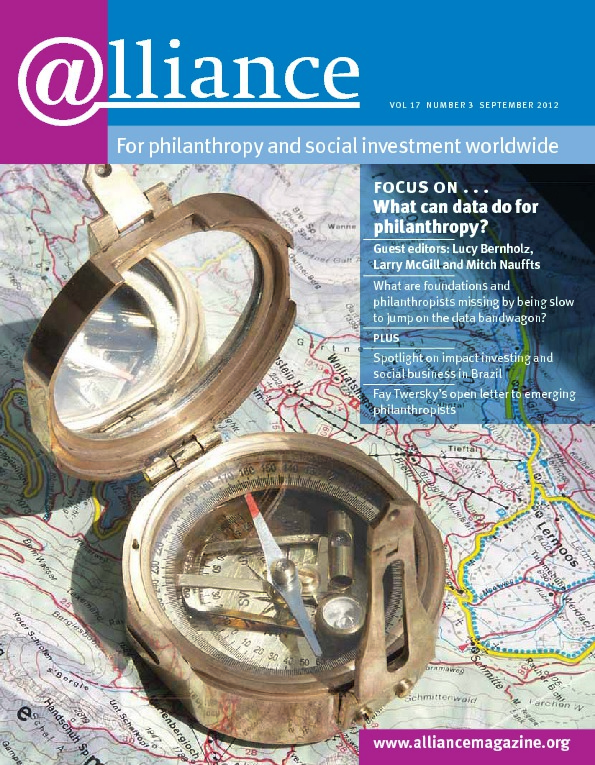Alliance’s making the issue of data central to this edition is very timely. Few people will doubt or question the importance of data in our professional context. I am sure this ‘new asset class’ will be in the centre of discussions in the philanthropic sector for the next few years. As is often the case, though, when a new item is put on the agenda, there is a danger of overpromising. Let me just counterbalance some of what is written here with three warning flags, each under the heading of a quote of Einstein.
‘Perfection of the means and confusion of the ends seem to characterize our age’
So that we don’t have more and more surveys dropping into our mailbox, it is vital that we reflect in advance on the use and added value of the data being gathered. Data gathering is expensive in terms of both budget and time allocation. It is important that everyone in the sector grasps this and uses data gathering carefully, avoiding overdose and mindful of budgetary trade-offs.
The danger is that surveys ask for too much data, forgetting that in reality only a few are needed for advocacy and policy purposes. It is also easy to forget that data are often relevant only if one can compare them year by year. This means that data gathering needs to be structurally embedded in an organization and that the budget needs to be guaranteed for more than just a one-off exercise.
Along the same lines, if one pleads for transparency in the foundation sector, there should be an agreement about what really matters in this debate. We should avoid creating ‘transparency about trivial matters’, as Phil Buchanan of the Center for Effective Philanthropy has put it.
‘Information is not knowledge’
It is of course a no-brainer to say that using data can simplify reality by looking at it through a specific lens. This can of course be very useful as long as we remain conscious of it. Data have to be put in a context and the real story of foundations is in the details.
Some years ago a European Commission study stated that European foundations were bigger in terms of endowment and expenditure than their US counterparts. This made sense only because the study looked just at US grantmaking foundations and not operating foundations, whereas for European foundations both were taken into account because there are no legal distinctions in Europe between operating and grantmaking foundations. This example shows that focusing on global data can sometimes become an intergalactic exercise and that the added value has to be carefully looked at.
It is easy to talk of data-driven knowledge but knowledge is not a construct of accumulated data. In systems thinking, a distinction is made between soft and hard approaches and both are relevant. The hard system thinkers develop models of a part of the world. Soft system thinkers are aware that an objective representation of reality is not possible and that the observer is also a factor. Without making things too complicated, it seems that pragmatically speaking one cannot rely on only one approach.
‘Knowledge of what is does not open the door directly to what should be’
Data gathering is a time-consuming and expensive exercise and there is a risk that smaller charities and foundations will be confronted with a kind of digital divide because they do not have the staff or the budget to compile and maintain data on their activities.
On top of that, some move too quickly from the idea of data providing transparent information on charities and foundations towards the idea of a tool for benchmarking and labelling based on this data gathering. As I’ve mentioned, reality is too complex to be based on quantitative data only. People who want to use quality labels have of course their own value systems. To make those quality labels and benchmarks credible, it is essential that they are constructed involving all the stakeholders, especially those who will be judged: charities, foundations and associations. Foundations and charities don’t exist in a vacuum; they are embedded in a community, small or large.
In flying these warning flags, I don’t want to underplay the importance of data gathering in the foundation sector. Other warning flags could be added, too. This should not stop us investing in this new ‘unnatural resource’, but in dealing with our challenges, we have to accept their complexity.
Luc Tayart de Borms is managing director of King Baudouin Foundation. Email TAYARTdeBORMS.L@Kbs-frb.be


Comments (0)